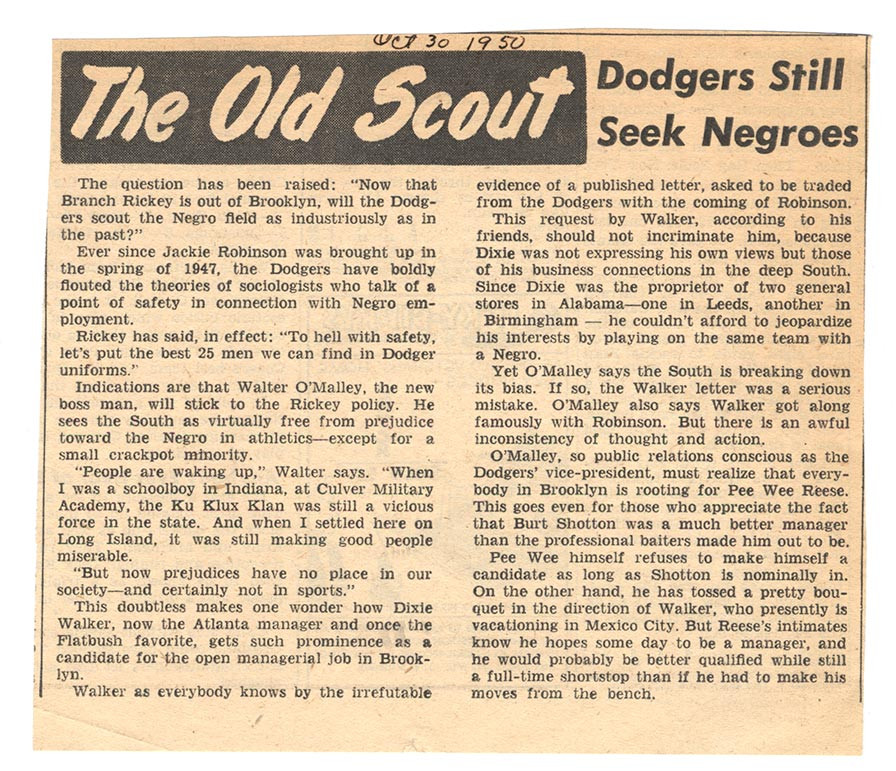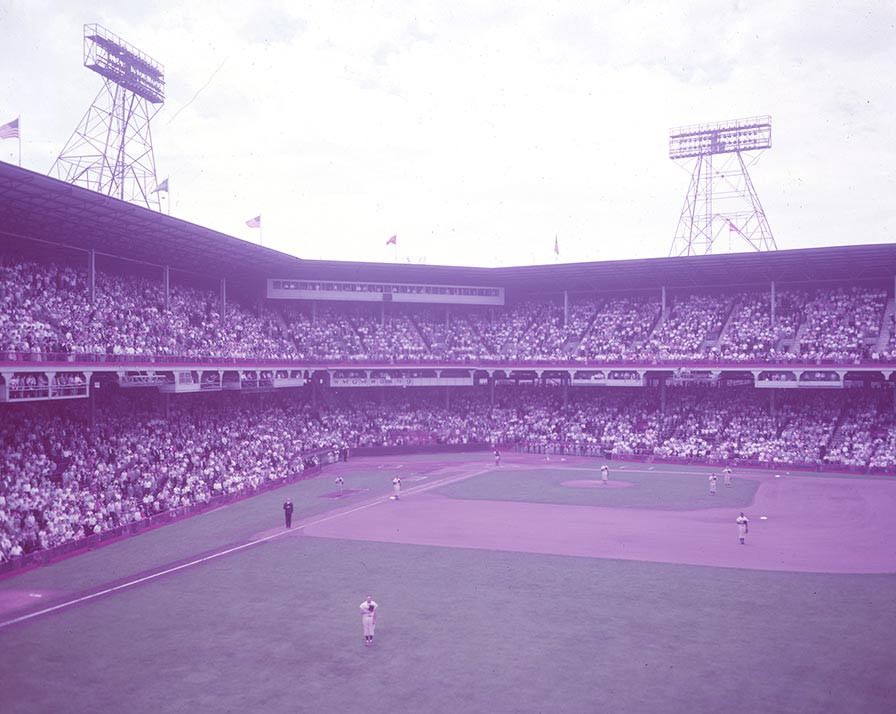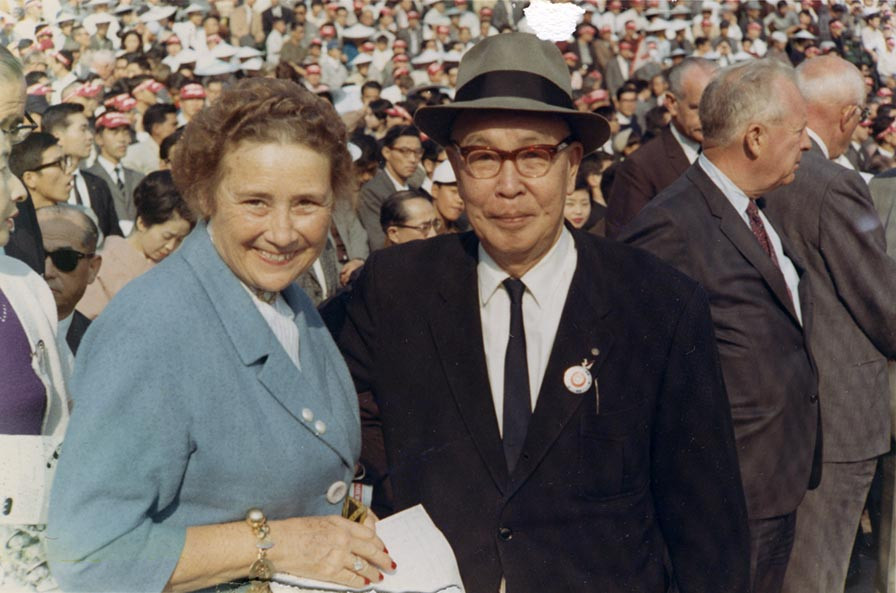This Day in Walter O’Malley History:
-
New Dodger President Walter O’Malley comments about the future for African-American players in his regime. “People are waking up...prejudices have no place in our society — and certainly not in sports.” The Old Scout, Grit Newspaper, October 30, 1950
-
New York real estate investor Marvin Kratter pays $3 million to the Dodgers to purchase Ebbets Field in Brooklyn and arranges to lease it back for three years (plus two option years through 1961) from Kratter’s assignee, Tillie Feldman. According to Associated Press, “Negotiations for the sale had been going on for months. Walter O’Malley, president of the club who is now with the Dodgers on their tour of Japan, has been quoted as saying the field was outmoded as a baseball park. A committee representing the Brooklyn Sports Center Authority is making a survey as to the feasibility of building a huge sports center which the Dodgers could call home. Henry J. Walsh, attorney for the ball club, said the sale was in no manner a preamble to the removal of the Dodgers to another city.”
-
Paul Zimmerman, Los Angeles Times Sports Editor, writes in his “Sportscripts” column, “Not all the New York writers are castigating Walter O’Malley for bringing the Dodgers here...‘I’m afraid you’ll find a surprising number of alleged ‘bush’ towns are good sports towns and, while I hate to admit it, Los Angeles is definitely one of them,” writes Jimmy Powers of the New York Daily News...‘They’ve got our Dodgers on merit.’” Paul Zimmerman, Los Angeles Times, October 30, 1957
-
John J. McHale, President of the Milwaukee Braves, writes to Walter O’Malley following the Dodgers’ disappointing loss to the San Francisco Giants in the best-of-three National League playoff series. The Dodgers won 102 games in 1962 but were shut out of the World Series by losing to the pennant-winning Giants, two games to one. “Dear Walter: Everyone is anxious to congratulate the winner, but in your case you deserve special attention. I want to congratulate you and your staff on how you took one of the toughest setbacks that I can remember in baseball. No one enjoys being congratulated on being a loser but I don’t think there are many of us who could have taken it in such big league style.”
-
Walter O’Malley writes a letter to attorney James G. Starkey of Brooklyn, who is interested in becoming a major league baseball broadcaster. In the letter, O’Malley explains to Starkey that the broadcasters are hired by advertising agencies (with team approval rights). “The agencies, for their sponsors, foot the bill covering the announcers salary and expenses and they first satisfy themselves that the quality of voice and delivery is such that the sponsor’s message will be delivered to their liking,” writes O’Malley. “The ballclub, operator, on the other hand, wants to know if a sportscaster can give an impartial and factual account of the game. He expects the sportscaster to have a background of experience that can interpret anecdotes or bits of information that the fans will enjoy. He does not want an editorial reader or sing-song Pollyanna. On our club we try to keep the broadcast impartial, and not to give it the hometown touch. At major league level the sportscaster is generally selected from a large field of applicants and I must admit there are only 3 or 4 who could be classed as ‘superior.’...As you know, I started out in law and spent 25 years practicing it and it was only after I was fairly comfortably fixed that I was able to indulge myself in a full time baseball career...The baseball bug is a bad one, like a virus for which no antibiotic has been discovered.”
-
Sandy Koufax is named the 1963 National League Most Valuable Player less than a week after being named the Cy Young Award winner. Koufax was 25-5 with the Dodgers in 1963 and won two games in the 1963 World Series for the Dodgers’ World Championship.
-
Walter O’Malley writes to his friend and sports columnist Sotaro Suzuki in Yokohama, Japan informing him that he would be available to meet in Los Angeles. O’Malley informs Suzuki that the idea put forth by Yomiuri Giants owner Matsutaro Shoriki, about a true Japanese-American World Series being played is doubtful for the foreseeable future. “I fully appreciate how sincere Mr. Shoriki is but I do not want to give him false encouragement,” writes O’Malley. “He has been a strong man for baseball and he deserves to have his request given serious consideration. This, however, is not the time to push the matter and I believe the chances of success would be somewhat greater once we know the identity of the new Commissioner of Baseball. There are other problems involved such as radio and television, multi-million dollar contracts and our present inability under existing contracts to require the players to participate in any baseball games after the World Series. Let me know your plans and of course, extend my respectful regards to Mr. Shoriki.” Matsutaro Shoriki, who also owned the Yomiuri Shimbun, was known as the “father of professional baseball in Japan.”




